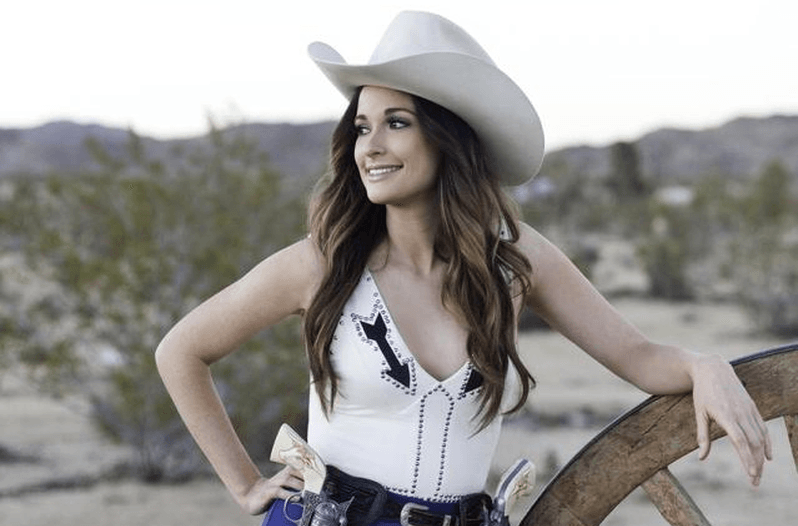Kacey Musgraves' climb to mainstream acceptance got a massive boost by the Oct. 21, 2013 release date of "Follow Your Arrow." It's the third single off her big-label debut with Mercury Records, Same Trailer Different Park, and it remains a career touchstone. This continued success comes with potentially divisive lyrical talking points that generally don't come up in country songs.
Inspired by a poem she wrote for a friend taking an overseas trip, Musgraves co-wrote the song with openly gay writers Brandy Clark and Shane McAnally. It's about self-acceptance, imploring listeners to not worry too much about whether others judge their life choices. In a just world, all three songwriters' existing reputations for penning Miranda Lambert's "Mama's Broken Heart" together would grow from "Follow Your Arrow." That is if a few controversial lines didn't scare off too many potential fans.
Despite a lack of country radio airplay and an ample amount of controversial lyrics, the song cracked the Billboard Hot Country Songs top 10 in the United States and the top 50 in Canada. It helped introduce its singer to the country music awards show and international touring circuits. Success lasted beyond the typical promotion cycle, as the song has been certified a gold single by the RIAA and remains a talking point regarding country music's current role in political discourse.
Since its release, much of the attention gained by "Follow Your Arrow" points to the lyrics that reference same-sex relationships and marijuana use. Both are hot-button issues in America that many might assume would be instant turn-offs for the average country music fan. The song's sustained popularity opens up a dialogue about whether or not presumably conservative listeners do see either issue as a no-go.
"Kiss Lots of Girls if That's Something You're Into"
The song's live and let live lyrics regarding gay people came just three years after Chely Wright made headlines by being the first country star of her caliber to come out of the closet. Although some potential fans surely write off Musgraves as too liberal, the song didn't halt the success of Same Trailer Different Park or later releases. Either Wright and other openly gay country singers, like Billy Gillman, made a significant enough impact on changing listeners' minds in a short span of years, or Musgraves' ageless messages of loving your neighbor and minding your own business overshadowed socio-political divisiveness enough for her not to get "Dixie Chicked."
"Roll Up a Joint, or Don't"
As for marijuana, it's a topic synonymous with Musgraves' pal Willie Nelson. Nelson is an established name (and a man), so he's less likely to alienate hardcore country fans with his political platforms. Musgraves' weed references stand out, yet they don't seem to drive away potential listeners. Instead, she keeps on writing down-home country albums for folks who otherwise might not listen to songs about blowing that kind of smoke.
Even if fans don't necessarily find marijuana references off-putting, at least some in the music business panicked over Musgraves' lyrics at the time. Viewers of the 2013 Country Music Association (CMA) awards broadcast didn't get to decide for themselves if they were comfortable with the "roll up a joint" line because it was muted. Perhaps today's country fans are more open-minded than industry types, or television networks might've assumed?
A Cleverly-Worded Country Song
The before-mentioned references to less typical country song topics don't make up the only memorable lines of "Follow Your Arrow." Quips about how no one is righteous in the eyes of their most judgmental adversaries carry a song that's about more than kissing other women or rolling a joint. "If you save yourself for marriage, you're a bore," sings Musgraves in the first verse. "If you don't save yourself for marriage, you're a horrible person." The idea of the song is less about living recklessly and not worrying about how others perceive you. It's home-spun wisdom instead of a political rant, making it accessible to fans whether they support or shun the song's more controversial talking points.
A Different View On Young Nashville
Musgraves' appeal includes her evident appreciation for country-related music's rich past. After all, she used the "Follow Your Arrow" music video shoot as a reason to stay at the Joshua Tree Inn, a spot made infamous by Gram Parson's untimely death. Likewise, the song's lyrics and message help present younger Nashville performers and songwriters differently than stereotypical county stars from prior decades. In the process, Musgraves built a wholesome-yet-hip reputation that allows both old-school fans and the young devotees of famous friends like Katy Perry to embrace a modern country music outlaw.
Looking back at the song's legacy, it might be too idealistic to wonder if it changes people's perceptions of modern country songwriting. Realistically, one pop-friendly composition isn't enough to serve as a straw poll for the masses. Based on Musgraves' widespread appeal following an early-career single that dealt with heavy, real-life issues, it hasn't pulled too many country music fans from different generations and belief systems away from great new music.
This post was originally published on March 15, 2018.





